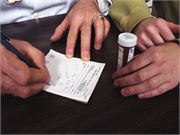Over 40% of Antibiotics Could Be 'Inappropriately' Prescribed
By Steven ReinbergHealthDay Reporter

WEDNESDAY, Dec. 11, 2019 (HealthDay News) -- When your doctor prescribes an antibiotic, there's a 43% chance it may not be needed, a new study finds.
"While there has been a lot of research looking at inappropriate prescribing, our findings suggest that we still may be underestimating the proportion of prescriptions that are inappropriate," said lead study author Michael Ray, a researcher at Oregon State University College of Pharmacy.
The problem of overprescribing antibiotics is twofold. First, they can cause serious side effects. Second, and more important, is that flooding the world with antibiotics has resulted in an ever-growing number of drug-resistant bacteria -- germs that today's antibiotics can't kill.
Inappropriate antibiotic prescribing may be even more rampant than these data show, said Ray. "Because antibiotic resistance is such a pervasive health issue, it is important to limit inappropriate prescribing to the best of our ability," he said.
Using information from the National Ambulatory Medical Care Survey, Ray and his colleagues collected data on more than 990 million doctor visits across the United States in 2015.
Of these, about 130 million (13%) involved an antibiotic prescription. Using diagnostic codes, Ray's team members were able to determine if these prescriptions were appropriate or inappropriate.
They found that 57% of the antibiotic prescriptions were given for good reason, but 25% were inappropriate. Whether the remaining 18% were appropriate or inappropriate could not be determined from these data, Ray and his team noted.
So 43% of prescriptions could be potentially inappropriate, said the researchers.
Certain folks were more likely to get potentially unneeded antibiotics than others. These data revealed that roughly 20% of those aged 18 and older got antibiotics without a documented indication, compared with 8% of children.
Patients who spent more time with their doctor were more likely to get an antibiotic without an indication -- 15% with shorter visits and 21% with longer visits.
Also, 22% of patients with chronic conditions were more likely to get antibiotics without an indication, compared with 14% of patients without a chronic illness.
Primary care doctors were much less likely to prescribe antibiotics without an indication (12%) than specialists, who prescribed the drugs as much as 29% of the time.
Antibiotics can cure an infection caused by bacteria, but won't help one caused by a virus, said Dr. Marc Siegel, a professor of medicine at NYU Langone Medical Center in New York City.
He said doctors often prescribe antibiotics to be on the safe side because they can't tell whether an infection is viral or bacterial.
Also, some doctors feel pressured by patients to get some kind of treatment, so they prescribe an antibiotic and make the patient feel something was done, said Siegel, who wasn't involved with the study.
The upshot of overprescribing has been the steady development of bacteria resistant to antibiotics, he said.
One of particular concern is "this new fungus that's going around, CRS [chronic rhinosinusitis]," Siegel said. This sinus infection "is a very difficult one to treat. And it's very pervasive."
Siegel expects new antibiotic-resistant bugs to keep showing up. "We're getting to a situation where more untreatable or difficult-to-treat bugs are emerging," he said. "Gone are the days when the only arrow you needed in your quiver was penicillin."
However, new antibiotics aren't coming on board, Siegel said.
"We're still using antibiotics developed in the 1980s," he said. "Antibiotics are only used when you're sick. It's not like you take a daily drug, so it's not a big moneymaker for drug companies. There's not a lot of incentive for drug companies to be exploring and finding new antibiotics."
Siegel's advice is to look for discerning doctors. "Don't go in looking for pills, go in looking for answers, and don't look down on a doctor who decides you have a virus," he said.
The report was published online Dec. 11 in BMJ.
More information
For more on antibiotic resistance, head to the U.S. Centers for Disease Control and Prevention.

The news stories provided in Health News and our Health-E News Newsletter are a service of the nationally syndicated HealthDay® news and information company. Stories refer to national trends and breaking health news, and are not necessarily indicative of or always supported by our facility and providers. This information is provided for informational and educational purposes only, and is not intended to be a substitute for medical advice, diagnosis, or treatment.

